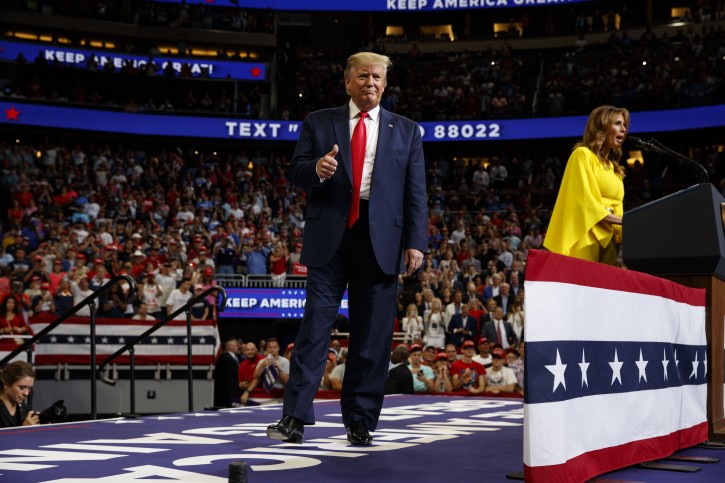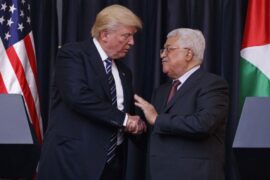United States President Donald Trump formally launched his 2020 re-election campaign Tuesday night before a jam-packed crowd in Orlando’s Amway Center arena.
After brief remarks by Vice President Mike Pence and First Lady Melania Trump, the president took the stage to chants of “USA!”and lashed out at the “unholy alliance of lobbyists and donors and special interests” who have been opposing his administration while “bleeding our country dry.”
“The swamp is fighting back so viciously and violently,” he said.
“For the last two and a half years, we have been under siege.”
While Trump has been an incredibly polarizing figure in both American and world politics, he should be viewed not as a radical departure from his predecessors but rather as a logical result of the capitalist system. He is simply the system unmasked.
Despite massive popular opposition to Trump’s policies and style, one group that has been consistently supportive of the president has been the American-based pro-Israel community, mostly comprising right-wing Diaspora Jews and fundamentalist Christians.
Many of these supporters are convinced that Donald Trump has been the most pro-Israel American president in history and very much hope to see him remain in the White House for four more years.
But regardless of whether Trump wins the 2020 election, his time in office will eventually come to an end and the pro-Israel community would do well to think strategically about what might come next for US-Israel relations.
Even if we ignore Trump’s empowering of American white nationalists or the fact that his administration’s plan for the Middle East will likely aim to force the partition of Eretz Yisrael, we must still acknowledge that even his moving the US embassy to Jerusalem and recognition of Israeli sovereignty over the Golan heights are reversible policies.
Therefore, even those die-hard Trump supporters within the pro-Israel community should focus all efforts on promoting and advocating for the president to allow a gradual shift towards ending US aid to Israel.
In addition to being an American government subsidy to its own arms industry, the aid Israel receives actually limits Israel’s independence and has for decades allowed Washington to infringe on Israel’s sovereignty.
Since the early 1970s, successive US administrations have placed heavy pressure on Israel’s leadership to comply with America’s foreign policy agenda – one that has often placed Israel in positions of weakness vis-à-vis our neighbors.
Using the aid as diplomatic leverage, American officials have succeeded in removing a number of Israeli leaders from office and pressuring others to comply with US demands.
In recent years, many Israeli prime ministers have begun to view themselves less as heads of an independent state and more as vassal rulers for a foreign power. Rather than act in the interest of their people, these leaders have often sought American approval for major policy decisions, especially those pertaining to diplomacy, trade, national defense and our homeland.
Israel’s already tenuous situation became worse when former US President Barack Obama deepened Jerusalem’s dependency on Washington with a ten year $38 billion memorandum of understanding agreed upon during the final year of his administration. This new MOU allocates $3.3 billion in military financing and $500 million in missile defense each year to Israel while altering the previous terms of the aid Israel receives.
Until Obama’s MOU, roughly 25% of the aid, adding up to billions of shekels per year, could be spent on local Israeli products while three quarters of the money had to be spent on American arms and equipment often more expensive and qualitatively inferior to their Israeli equivalents.
But according to the new agreement that began this fiscal year, 100% of military aid will have to be spent on American products, resulting in major losses for Israeli defense companies that have essentially lost their own military as a client.
Foreign aid is generally used by Washington as a means of controlling developing countries viewed as strategically important to US interests while at the same time funneling most of the money back to American companies (arms, oil, construction, etc.). Once dependent on the money, these countries tend to come under the control of the US and are bullied into cooperating with Washington’s imperialist policies.
A nation cannot be both dependent and independent. Decades of receiving US aid has eroded Israeli sovereignty and placed the Jewish state in a situation of economic and military dependency that has given American leaders dominion over nearly all areas of Israeli policy. If Jerusalem can achieve independence by the time Trump leaves office, his successors will have far less control.
Rather than concern ourselves with whether Israel will have a benevolent or hostile emperor in Washington, we should focus our energies on actually obtaining freedom.
If Trump is truly as good a friend to the people of Israel as he likes to profess, facilitating a smooth transition towards complete Israeli independence before he leaves office would be the best way to substantively show it.





